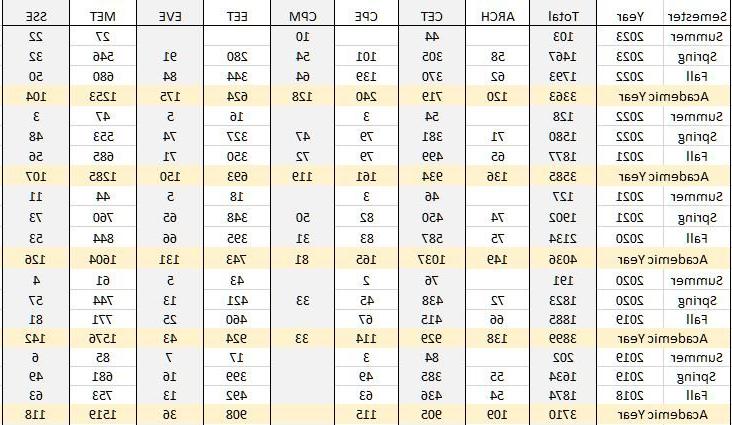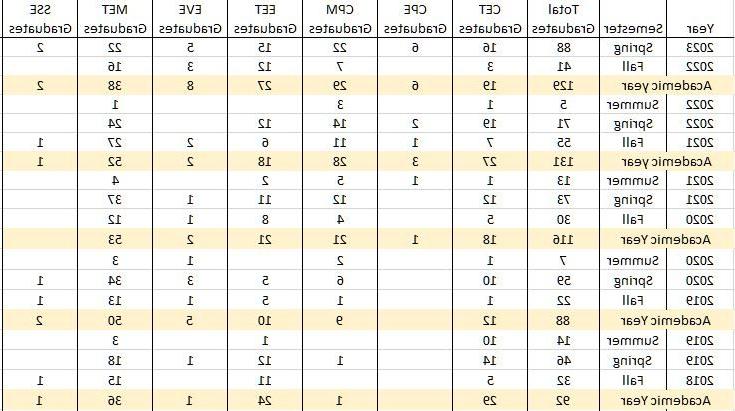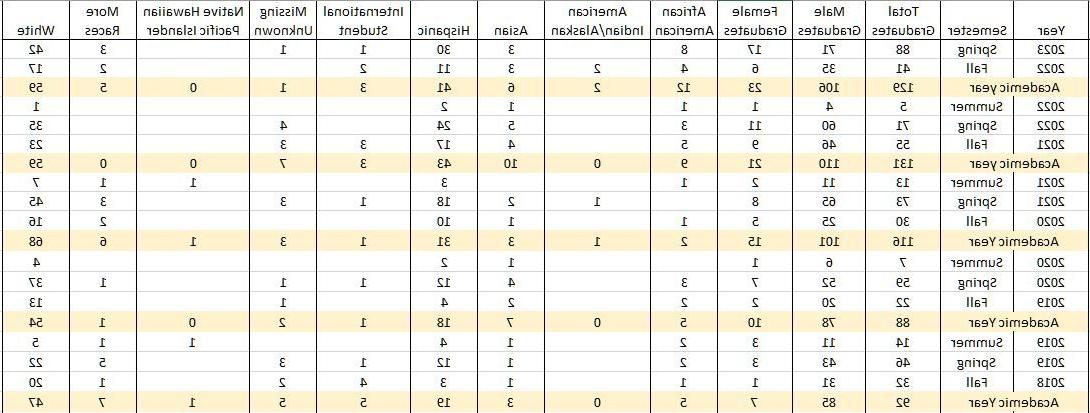Request Information
Ready to find out what MSU Denver can do for you? We’ve got you covered.
Accreditation assures that our programs meet the educational standards that prepare graduates to work in Engineering and related fields, and it is a globally recognized standard of education. Accreditation is also important for licensing because it facilitates our graduates’ completion of the Fundamentals of Engineering (FE) exam and later the Professional Engineer (PE) exam, so that they can become licensed professional engineers. If you would like to learn more about ABET and accreditation, please visit ABET’s website.
The Computer Engineering program at MSU Denver is accredited by the EAC Accreditation Commission of ABET.

The Civil Engineering Technology, Electrical Engineering Technology, Mechanical Engineering Technology, are all accredited by the ETAC Accreditation Commission of ABET.

This is the number of declared majors and minors in the department. The number of declared majors and minors is take at the Fall Census date and used for the Academic Year.

Enrollment counts all students in every EAET class session, this may result in a student being counted multiple times if they have registered in multiple classes.



On a regular basis our EAET programs are evaluated. Below you can see what the department is doing to prepare students and what students will be able to do upon their graduation.
The Constituencies for all EAET Programs are identified as:
1) Students and Alumni, 2) EAET faculty, and 3) EAET Industrial Advisory Boards (IAB).
Program Educational Objectives for all EAET Engineering Technology Programs
The program education objectives for the Civil Engineering Technology Program have been identified as:
1. Be employed in an engineering or engineering related industry.
2. Perform engineering duties in industry with progressive responsibilities or proceed to graduate school.
3. Engage in lifelong learning and professional development by acceptance and attendance in classes or being active members in one or more professional organizations related to their field.
4. Function as a responsible member of society demonstrating professionalism in their work assignments and exhibit the following characteristics:
a. Ethics, including commitment to honesty and integrity
b. Quality performance and timeliness
c. A willingness to learn new material and train and mentor fellow employees
5. Apply their technical leadership and communication skills to practice professionally in a collaborative, team-oriented manner that embraces the multidisciplinary and multicultural environment of today’s business world.
Program Student Outcomes
The program must have documented student outcomes that support the program educational objectives. Attainment of these outcomes prepares graduates to enter the professional practice of engineering. Student outcomes are outcomes (1) through (5)
Program Educational Objectives for all EAET Engineering Technology Programs
The program education objectives for the Electrical Engineering Technology Program have been identified as:
1. Be employed in an engineering or engineering related industry.
2. Perform engineering duties in industry with progressive responsibilities or proceed to graduate school.
3. Engage in lifelong learning and professional development by acceptance and attendance in classes or being active members in one or more professional organizations related to their field.
4. Function as a responsible member of society demonstrating professionalism in their work assignments and exhibit the following characteristics:
a. Ethics, including commitment to honesty and integrity
b. Quality performance and timeliness
c. A willingness to learn new material and train and mentor fellow employees
5. Apply their technical leadership and communication skills to practice professionally in a collaborative, team-oriented manner that embraces the multidisciplinary and multicultural environment of today’s business world.
Program Student Outcomes
The program must have documented student outcomes that support the program educational objectives. Attainment of these outcomes prepares graduates to enter the professional practice of engineering. Student outcomes are outcomes (1) through (5)
Program Educational Objectives for all EAET Engineering Technology Programs
The program education objectives for the Mechanical Engineering Technology Program have been identified as:
1. Be employed in an engineering or engineering related industry.
2. Perform engineering duties in industry with progressive responsibilities or proceed to graduate school.
3. Engage in lifelong learning and professional development by acceptance and attendance in classes or being active members in one or more professional organizations related to their field.
4. Function as a responsible member of society demonstrating professionalism in their work assignments and exhibit the following characteristics:
a. Ethics, including commitment to honesty and integrity
b. Quality performance and timeliness
c. A willingness to learn new material and train and mentor fellow employees
5. Apply their technical leadership and communication skills to practice professionally in a collaborative, team-oriented manner that embraces the multidisciplinary and multicultural environment of today’s business world.
Program Student Outcomes
The program must have documented student outcomes that support the program educational objectives. Attainment of these outcomes prepares graduates to enter the professional practice of engineering. Student outcomes are outcomes (1) through (5)
Within a few years of graduation, alumni of the Metropolitan State University of Denver Computer Engineering Program will:
Student outcomes are used to evaluate the students and support the program educational objectives. The students in the Computer Engineering program are expected to attain the outcomes (1) through (7) as defined by ABET Criterion 3. Student Outcomes.
Within a few years of graduation, alumni of the Metropolitan State University of Denver Environmental Engineering Program will:
Student outcomes are used to evaluate the students and support the program educational objectives. The students in the Environmental Engineering program are expected to attain the outcomes (1) through (7) as defined by ABET Criterion 3. Student Outcomes.
Below are documents that support the work done in the Engineering and Engineering Technology department toward continued accreditation.